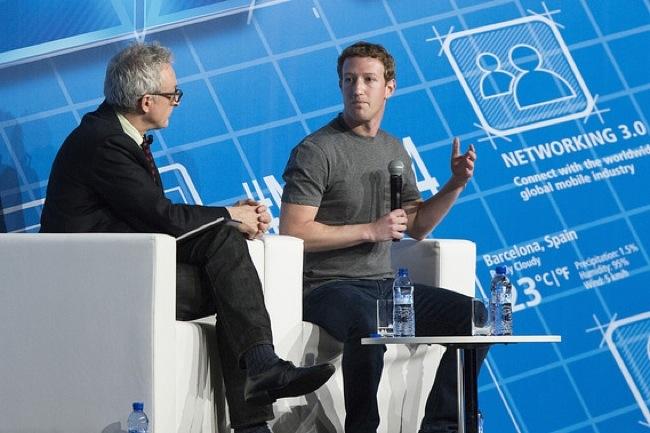
It isn’t just new products that are making the highlights out of Mobile World Congress 2014 that’s happening in Barcelona. Facebook CEO Mark Zuckerberg sat down with journalist David Kirkpatrick (and author of The Facebook Effect: The Inside Story of the Company that is Connecting the World) onstage today, where he was interviewed about the company’s latest happenings, including the recent acquisition of WhatsApp. Here are the 9 most important things we learned.
He wasn’t there to justify Facebook’s WhatsApp purchase
Facebook just bought WhatsApp for $19 billion, so obviously Kirkpatrick asked what was going on there. But Zuckerberg initially changed the conversation to Internet.org. (He returned to the subject of WhatsApp later.)
He was there to justify Internet.org
Internet.org, which Zuckerberg founded last year, launched as a partnership between Facebook and six mobile services companies (Nokia, Samsung, Qualcomm, Opera, MediaTek, and Ericsson) as a way to provide affordable Internet access to all (click here to read all you need to know about it).
“This is why I started Facebook,” Zuckerberg said. He admitted that Internet.org was going to lose money for a long period of time, but he still wants to do it. “There’s no clear plan that I can say today, that this will be good for Facebook, but I can say it will be good for the world.”
Zuckerberg noted that he lacked a clear plan for monetization when he started Facebook as well, but he believes that if they successfully connect everyone, there will be a way to reap the benefits of an Internet.org-connected world.
Zuckerberg framed his quest to connect everyone in the world, as more of a crusade to open people’s hearts and minds to the appeal of data than a serious infrastructure challenge. He mentioned that more than 80 percent of the world lives in places with 2G and 3G access already, and cited the Philippines as a success story in increasing Internet use.
He sees Facebook as a gateway drug or an “on ramp”
Kirkpatrick asked how Internet providers will benefit from Internet.org, and Zuckerberg talked about “upsells” as a path for eventual profit. By “upsells” he meant cajoling people who use basic free services into buying data with a one-click purchase. Zuckerberg noted that it will be up to the carrier what constitutes a basic service, so those basic services could be pretty limited. After all, even if Zuckerberg is embarking on the Internet.org project with altruistic intent, it doesn’t mean Facebook’s carrier partners are.
He’s looking for three to five more partnerships with carriers on Internet.org
Kirkpatrick asked what Zuckerberg wanted from carriers, seeing as Mobile World Congress is chock-full of them. Zuckerberg emphasized that Facebook is looking for just a few intensive partnerships. “For the next year, we’re really just looking to work with three or five companies that are really serious about trying to connect everyone in their country using free basic services,” he said.
Facebook actually wants to minimize data use
Zuckerberg talked about the company’s purchase of data compression startup Onovo and the company’s efforts to make apps more data-efficient. That’s why the company is working with Ericsson to open something called the Innovation Lab on its campus. This lab will help other app makers tweak their programs so they use less data.
Apparently Internet.org is a coalition, not just a Facebook-only project.
Zuckerberg emphasized that Internet.org is a collaborative effort. It was pretty unconvincing.
The NSA surveillance debacle is still a point of contention
Nothing new was said, but Zuckerberg reiterated how frustrated he was with the government’s surveillance behavior. “I really think this whole thing could’ve been avoidable,” he said.
He brushed off the idea that Facebook will mine WhatsApp’s message data
Zuckerberg noted that WhatsApp’s messages are deleted soon after they are sent and implied that Facebook would not change WhatsApp’s current data processes. We’ll see about that one. As Digital Trends’ Andrew Couts puts it, “Facebook didn’t become the world’s second-largest advertising platform by ignoring the wealth of data at its finger tips. And it would, at the very least, be odd for it to start now.”
Facebook defriended Snapchat
An audience member asked if Facebook was still interested in Snapchat and Zuckerberg made a face like he just bit into a poo-covered pretzel. When Kirkpatrick repeated the question, Zuckerberg said, “No.” And then he chuckled and said that Facebook was done buying companies for a while, since they had just made the WhatsApp purchase.
Editors' Recommendations
- Mark Zuckerberg: Facebook made ‘operational mistake’ before Kenosha shooting
- Zuckerberg wrote Facebook can ‘just buy any competitive startups’
- Zuckerberg denies secret deal with Trump for Facebook freedom
- Amazon, Apple, Facebook, and Google will testify before Congress in July
- Zuckerberg says Facebook will review content policies after employee outrage


